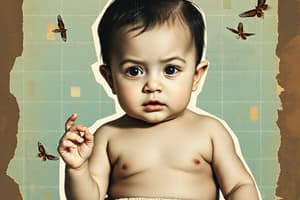Podcast
Questions and Answers
At what age do social fears like stranger wariness and separation anxiety typically develop in infants?
At what age do social fears like stranger wariness and separation anxiety typically develop in infants?
- 3 months
- 9 months (correct)
- 12 months
- 6 months
Which emotions are recognizable in infants transitioning from infancy to toddlerhood?
Which emotions are recognizable in infants transitioning from infancy to toddlerhood?
- Pleasure, curiosity, happiness (correct)
- Anger, surprise, joy
- Disgust, guilt, envy
- Sadness, fear, boredom
What forms the basis for attachment between infants and caregivers?
What forms the basis for attachment between infants and caregivers?
- Emotional bonds (correct)
- Physical appearance
- Similar personalities
- Shared interests
What is the lasting emotional bond formed between a child and a caregiver called?
What is the lasting emotional bond formed between a child and a caregiver called?
Which attachment style is classified as non-optimal based on caregiver responsiveness and reliability?
Which attachment style is classified as non-optimal based on caregiver responsiveness and reliability?
What public policy changes resulted from attachment research?
What public policy changes resulted from attachment research?
Which of the following is NOT a component of secure attachment?
Which of the following is NOT a component of secure attachment?
How do higher quality child care settings impact children compared to lower quality ones?
How do higher quality child care settings impact children compared to lower quality ones?
What did the National Institute of Child Health and Human Development study find about most infants in daycare?
What did the National Institute of Child Health and Human Development study find about most infants in daycare?
Which theory posits that reinforcement and punishment from parents shape personality?
Which theory posits that reinforcement and punishment from parents shape personality?
What is a key factor influencing secure attachment in child development according to the text?
What is a key factor influencing secure attachment in child development according to the text?
Why might exuberant toddlers find socialization more challenging according to the text?
Why might exuberant toddlers find socialization more challenging according to the text?
Flashcards are hidden until you start studying
Study Notes
- Infants and toddlers go through emotional and social development stages, transitioning from infancy to toddlerhood with recognizable emotions like pleasure, pain, curiosity, happiness, laughter, sadness, anger, and fear emerging at different ages.
- Social fears, like stranger wariness and separation anxiety, develop around 9 months, impacting how infants react to unfamiliar faces and being separated from caregivers.
- Emotional bonds between infants and caregivers are crucial and start developing from early stages, forming the basis for attachment which solidifies by the child's first birthday.
- Attachment is a lasting emotional bond formed between a child and a caregiver, influencing the child's connections with others and emotional development over a lifetime. It is based on synchrony, where caregivers respond sensitively to the infant's cues.
- Attachment research, originally studied with monkeys, led to changes in public policies like allowing parents in hospitals at all times to promote attachment and changing orphanage care to foster care with the goal of adoption.
- Mary Ainsworth's research classified attachment styles into secure attachment (optimal) and insecure attachment styles like avoidant, ambivalent, and disorganized (non-optimal) based on caregiver responsiveness and reliability.
- Secure attachment involves proximity maintenance, safe haven, secure base, and separation distress, providing a foundation for healthy development, while insecure attachment styles stem from inconsistent or unresponsive caregiving.
- Poverty during childhood can lead to compromised health, lower educational outcomes, and long-term impacts on brain development due to chronic stress from elevated cortisol levels.
- Interventions like the Head Start program aim to provide early childhood education and support for children from low-income families to mitigate the effects of poverty on development.
- Cognitive stimulation in the home, including reading, discussions, visual and auditory stimulation, is critical for brain development and can positively impact school readiness and educational outcomes.
- Child care settings vary, with many infants and toddlers in daycare, where higher quality care is associated with better language abilities, cognitive development, and cooperative behaviors compared to lower quality care.
- The National Institute of Child Health and Human Development study found that most infants in daycare achieve secure attachment, with sensitive parenting being a key predictor of attachment security.- Secure attachment is important in child development, influenced more by parent characteristics than child care features.
- When choosing child care, consider caregiver stability, attachment, caregiver-to-child ratio, physical setting for stimulation and safety.
- Freud's psychoanalytic theory includes psychosexual stages like oral and anal stages, impacting adult personalities.
- Erickson's psychosocial stages include trust vs mistrust in infancy and autonomy vs shame and doubt in toddlerhood.
- Behavioral theory states that personality is shaped by reinforcement and punishment from parents.
- Socialization involves teaching children societal norms and self-regulation, more successful with a goodness of fit model matching the child's temperament.
- Exuberant toddlers may find socialization more challenging due to lack of fear of consequences and rules.
- Shy children tend to have an easier time with self-control and socialization compared to exuberant children.
- Key to socializing a rambunctious toddler is offering positive guidance, setting clear limits, and accentuating their strengths in a suitable environment.
Studying That Suits You
Use AI to generate personalized quizzes and flashcards to suit your learning preferences.




